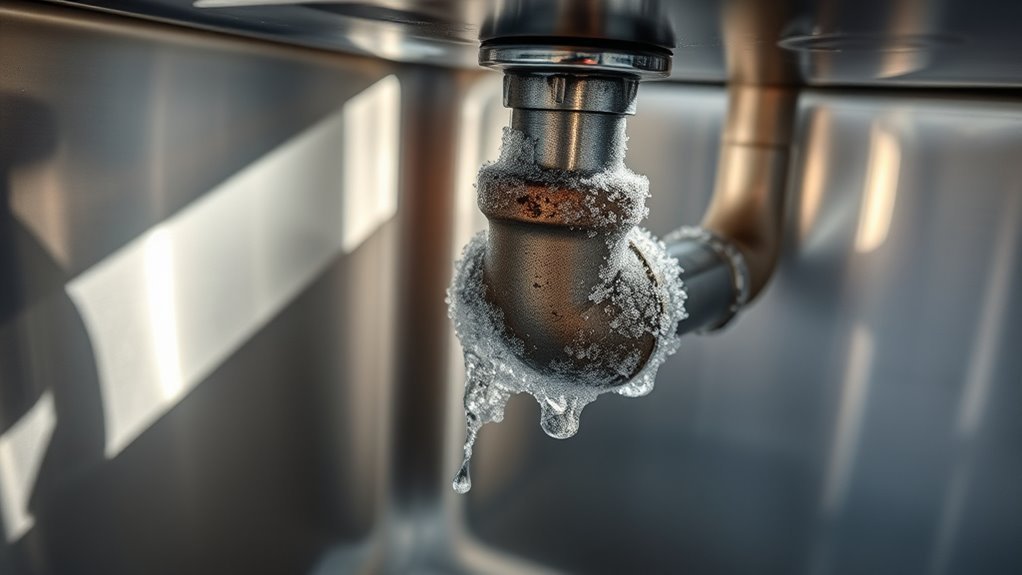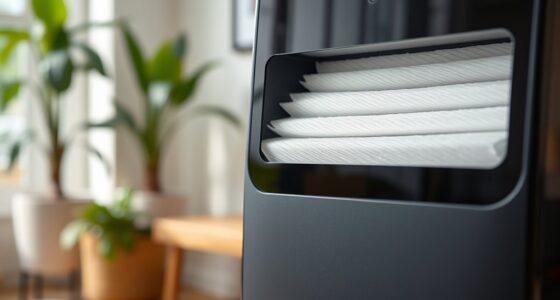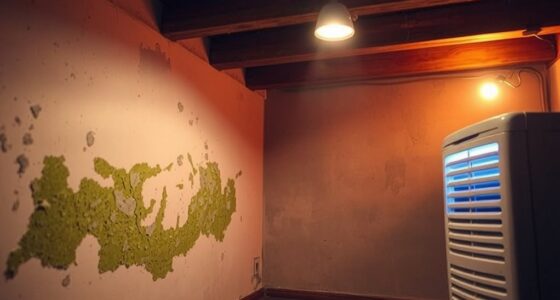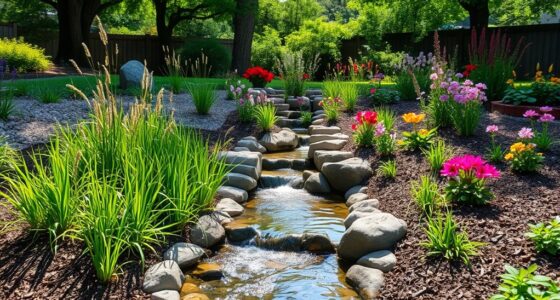The top mistake homeowners make every winter is neglecting proper insulation of kitchen pipes, especially those running through unheated areas. Without insulation, these pipes are vulnerable to freezing and bursting, which can lead to costly repairs. You might be unaware that simple steps like insulating pipes and avoiding draining fats down the drain can prevent big problems. Keep going to discover more essential tips to keep your plumbing safe all winter long.
Key Takeaways
- Failing to insulate kitchen pipes in unheated areas increases freezing and bursting risks during winter.
- Ignoring routine drain maintenance can cause blockages, leading to pressure buildup and pipe damage.
- Pouring grease or large food scraps down the drain solidifies and clogs pipes, especially in cold weather.
- Not supporting or securing kitchen pipes properly can cause sagging and stress in freezing temperatures.
- Overlooking preventive measures like drain screens and hot water flushes allows debris buildup and pipe issues.
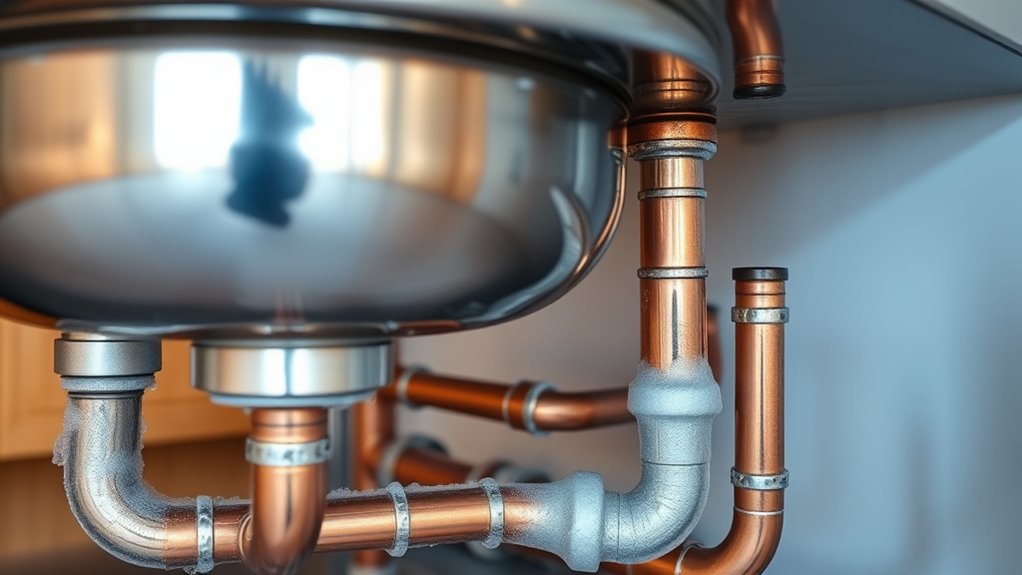
Winter can be tough on your kitchen pipes, especially if you’re unaware of common mistakes that can lead to costly damage. One of the biggest errors homeowners make during the colder months is neglecting proper pipe insulation. When pipes aren’t adequately insulated, they’re vulnerable to freezing, which can cause them to burst and flood your kitchen. To prevent this, you should invest in quality pipe insulation, especially for pipes running through unheated areas like basements, crawl spaces, or exterior walls. Wrapping these pipes with foam or fiberglass insulation keeps the water inside from freezing solid. It’s a simple step that considerably reduces the risk of costly repairs and water damage. Additionally, insulating pipes helps maintain a steady water flow, preventing sudden bursts that can damage your plumbing system. Proper GMC tuning can also help optimize your plumbing system for winter resilience by ensuring all components function efficiently.
Another common mistake is ignoring the importance of proper drain maintenance. During winter, drain clogs tend to become more frequent because cold weather can cause fats, oils, and grease to solidify in pipes. When these substances cool down, they create blockages that restrict water flow, leading to backups and potential pipe damage. To avoid this, you should be cautious about what goes down your drain. Avoid pouring grease or large food scraps into the sink, and consider using drain screens to catch debris before it slips into your plumbing. Regularly flushing your drains with hot water or a mixture of baking soda and vinegar can help break down build-up and keep things flowing smoothly. Preventing drain clogs not only keeps your kitchen functioning efficiently but also minimizes the risk of pressure buildup that can cause pipes to crack or burst under the strain. Incorporating preventive maintenance practices can further shield your plumbing from winter-related issues. Also, ensuring proper pipe support can prevent sagging and unnecessary stress on joints and connections during cold weather.
Many homeowners overlook the importance of proactive measures, especially during winter. Failing to insulate pipes leaves them susceptible to freezing, which is one of the most common and costly mistakes. Similarly, neglecting drain maintenance contributes to clogs that can worsen when water flow slows or stops altogether. Both issues can be easily avoided with a few simple precautions: insulate exposed pipes, be mindful of what you put down your drain, and perform routine maintenance. When you take these steps, you’re protecting your plumbing system from the harsh winter elements, saving yourself from emergency repairs and water damage. Remember, a little preparation goes a long way in keeping your kitchen pipes safe and functional throughout the cold season. Additionally, understanding the importance of projector contrast ratio can help you better appreciate how visual clarity impacts your viewing experience.
Frequently Asked Questions
How Can I Prevent My Kitchen Pipes From Freezing?
To prevent your kitchen pipes from freezing, you should start by pipe insulation, especially on exposed or unheated areas. Keep cabinet doors open to let warm air circulate around the pipes. Consider using antifreeze solutions if you’re in an extremely cold climate. Additionally, let a slow drip of water run through the pipes during cold snaps, which helps prevent freezing and potential bursts. Stay proactive to keep your pipes safe all winter long.
What Signs Indicate a Frozen or Burst Pipe?
If your pipes are frozen or burst, you’ll notice a sudden drop in water pressure or no water at all. You might also see frost on exposed pipes or hear banging sounds from the plumbing. To prevent this, guarantee proper pipe insulation, especially in unheated areas. Keep a steady drip of water running during cold spells to prevent freezing, and monitor your pipes for any early signs of trouble.
Are There DIY Solutions for Thawing Frozen Pipes Safely?
Did you know that nearly 10% of winter-related home insurance claims are caused by frozen pipes? When thawing frozen pipes, prioritize DIY safety by avoiding open flames or torches, which can cause fires. Instead, use gentle pipe thawing methods like applying heat with a hairdryer or using warm towels. Always work slowly, and if you’re unsure, it’s safest to call a professional to prevent further damage or injury.
When Should I Call a Professional Plumber for Pipe Issues?
If you notice persistent low water pressure, visible pipe corrosion, or suspect a leak, it’s time to call a professional plumber. Don’t ignore unusual sounds or freezing pipes, as these can worsen and cause damage. A plumber can evaluate the situation, prevent further issues, and guarantee your pipes are functioning properly. Addressing problems early helps avoid costly repairs and keeps your water system safe and reliable.
How Does Pipe Insulation Work to Protect Against Winter Damage?
You might think pipe insulation isn’t necessary, but its benefits are clear for winter pipe protection. Insulation works by creating a thermal barrier that prevents cold air from reaching your pipes, reducing the risk of freezing. It also helps maintain consistent temperatures, minimizing pressure buildup. Proper insulation is a simple yet effective way to safeguard your plumbing, ensuring your pipes stay safe and functional during the harshest winter months.
Conclusion
So, here’s the irony: you spend all winter worrying about frozen pipes, yet neglecting simple fixes can turn your cozy kitchen into a mini ice rink. It’s almost funny how something so small—like ignoring insulation or leaving a faucet dripping—can cause big problems. Next winter, maybe don’t wait until pipes freeze to act. After all, the biggest mistake is thinking you’ve got plenty of time—until you’re knee-deep in a frozen mess.
Amina brings over a decade of journalism experience to her role as Editor-in-Chief. Under her leadership, Exquisite Post has flourished, maintaining the highest standards of integrity and excellence. Amina’s commitment to truth and her visionary approach guide the editorial team in producing impactful news stories that resonate with our audience.
